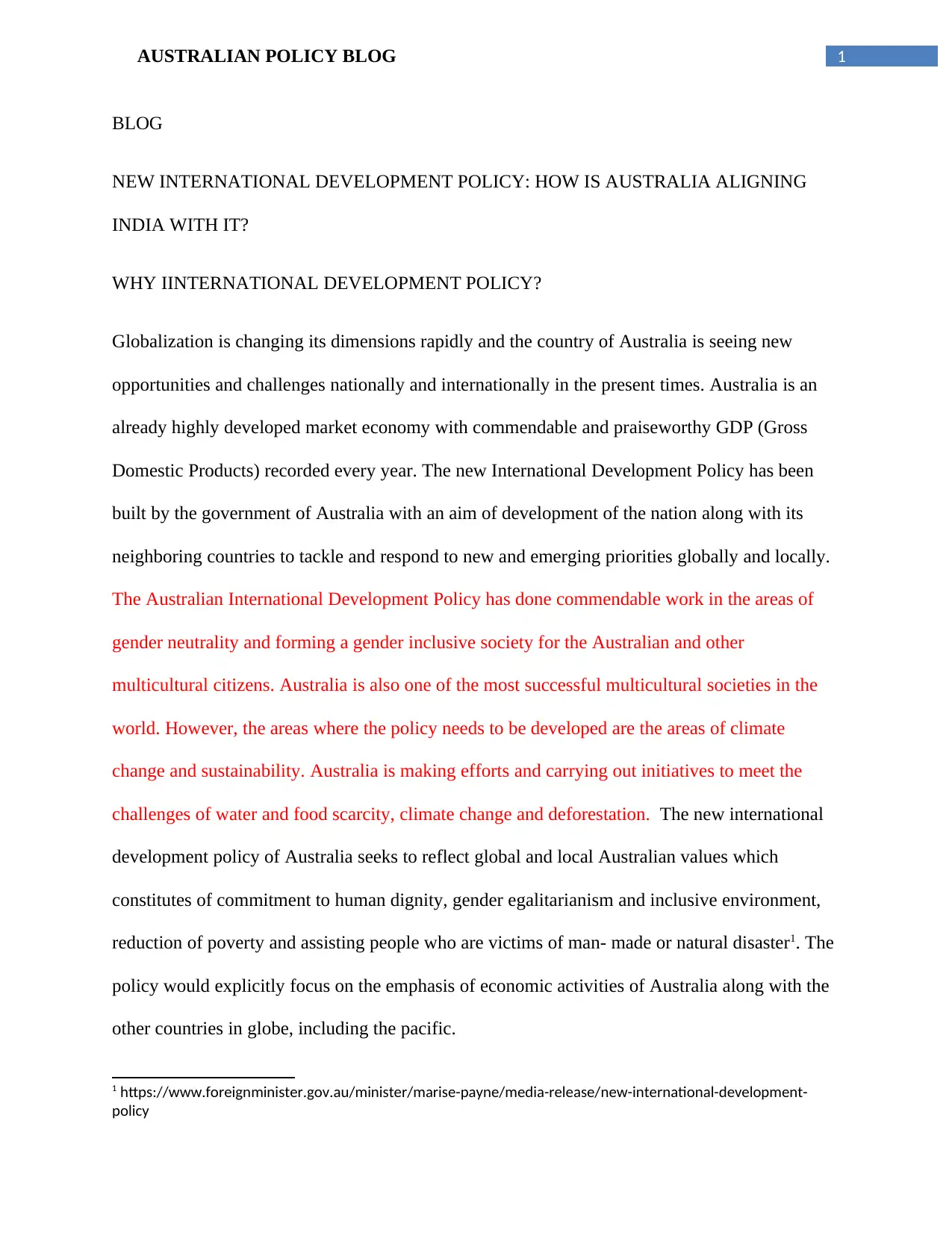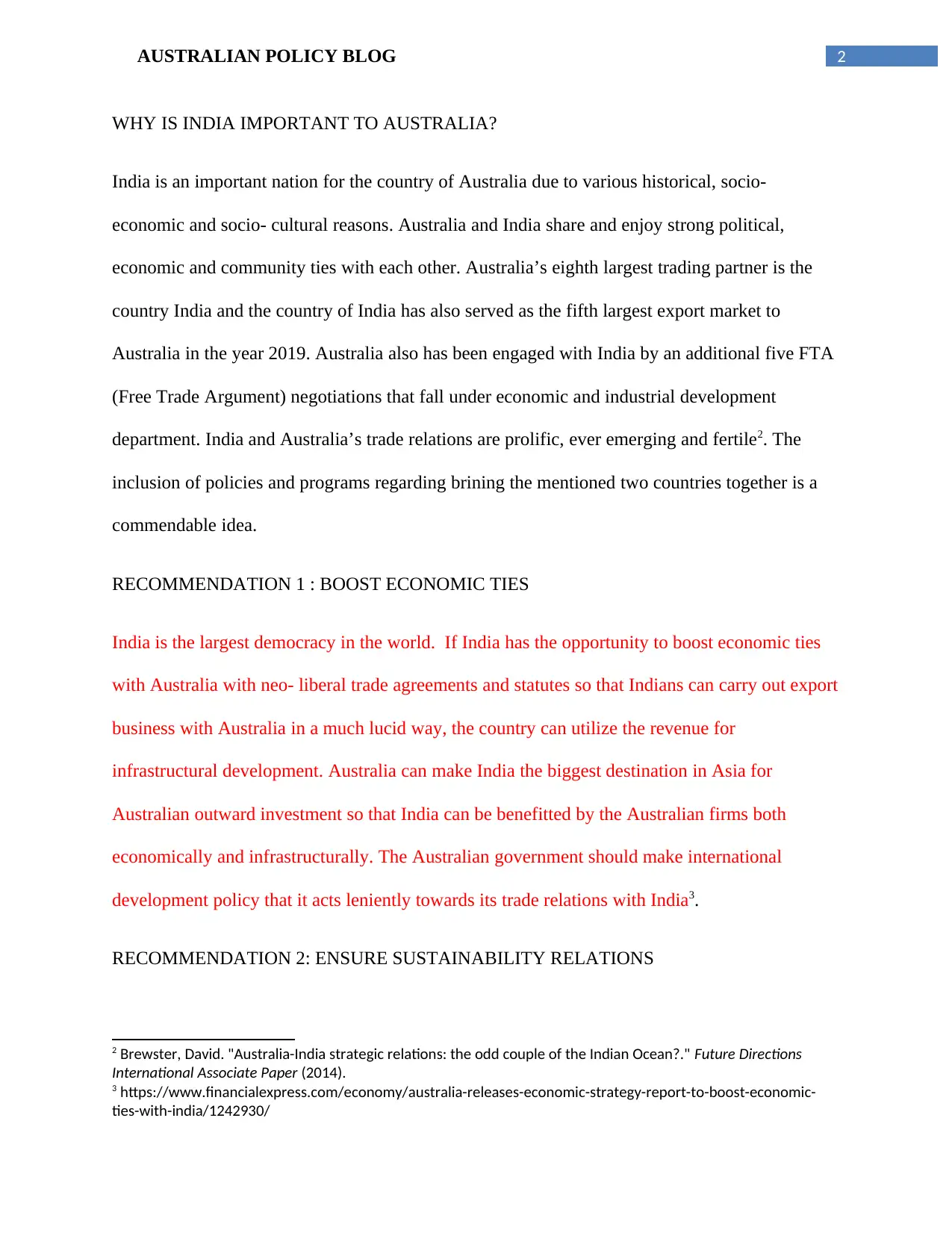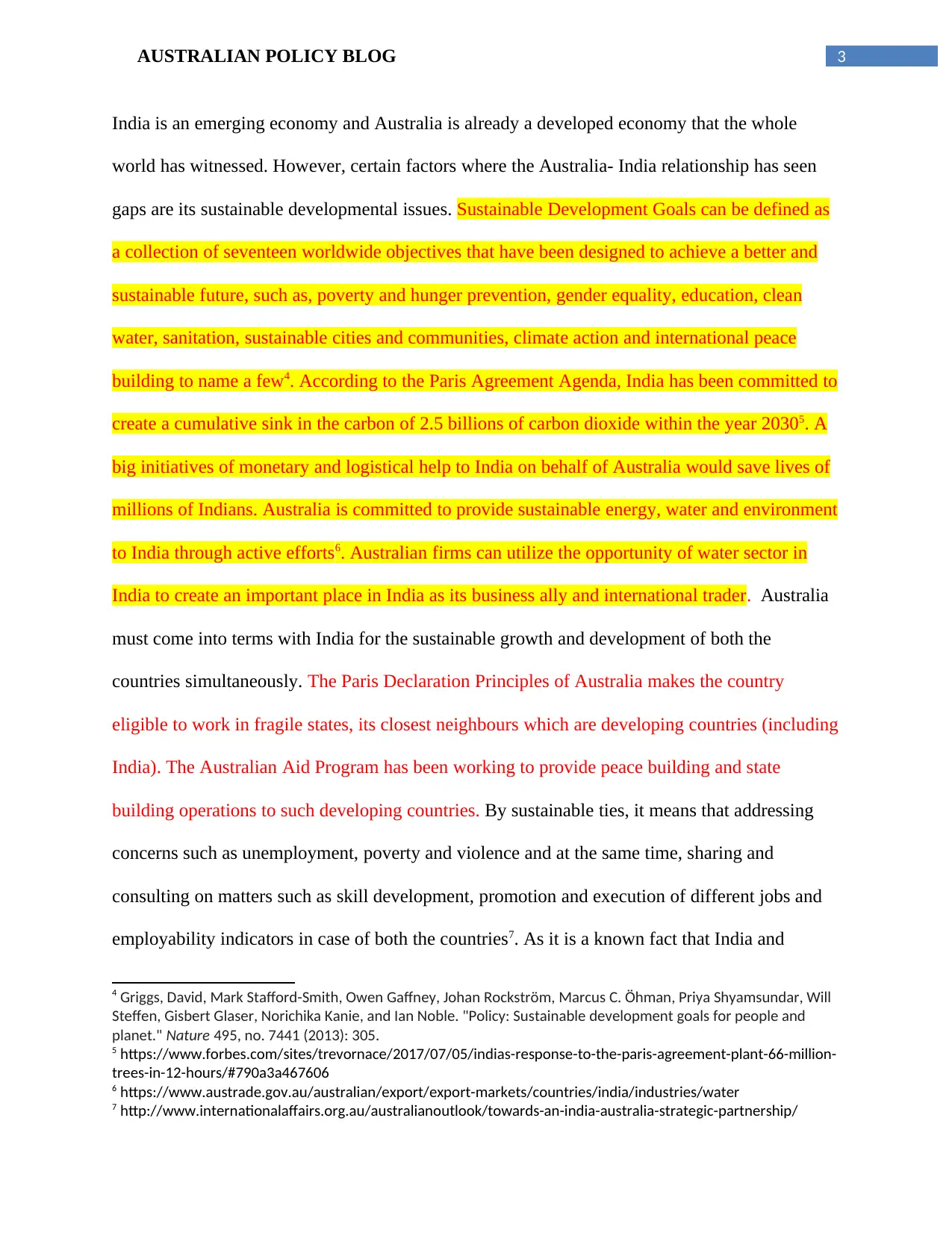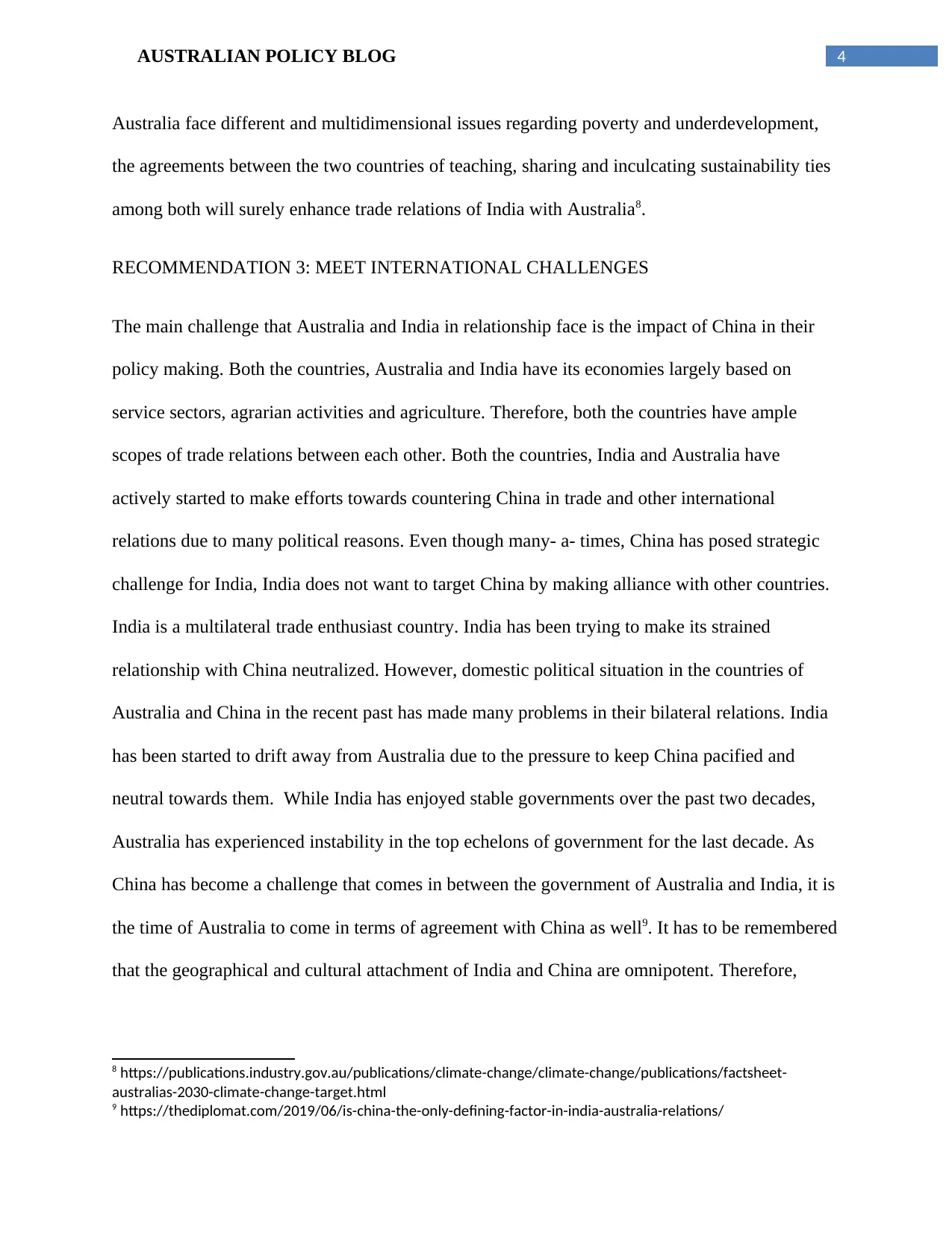Analyzing Australia's International Development Policy with India
VerifiedAdded on 2022/08/28
|6
|1183
|24
Discussion Board Post
AI Summary
This blog post analyzes Australia's new International Development Policy, focusing on its alignment with India. The author, a student, explores the importance of India to Australia, highlighting historical, socio-economic, and socio-cultural ties. The post provides three key recommendations: boosting economic ties through neo-liberal trade agreements, ensuring sustainability relations by addressing sustainable development goals, and meeting international challenges, particularly the influence of China. The recommendations are supported by academic literature and emphasize the need for Australia to make India a key destination for investment, provide monetary and logistical support for sustainability efforts, and strategize in a way that considers the geographical and cultural connections between India and China. The blog post underscores the significance of fostering a strong partnership between Australia and India to address global and regional challenges, including poverty, underdevelopment, and climate change, while also navigating the complexities of international relations.

Running head: AUSTRALIAN POLICY BLOG
AUSTRALIAN POLICY BLOG
Name of the student
Name of the university
Author Note
AUSTRALIAN POLICY BLOG
Name of the student
Name of the university
Author Note
Paraphrase This Document
Need a fresh take? Get an instant paraphrase of this document with our AI Paraphraser

1AUSTRALIAN POLICY BLOG
BLOG
NEW INTERNATIONAL DEVELOPMENT POLICY: HOW IS AUSTRALIA ALIGNING
INDIA WITH IT?
WHY IINTERNATIONAL DEVELOPMENT POLICY?
Globalization is changing its dimensions rapidly and the country of Australia is seeing new
opportunities and challenges nationally and internationally in the present times. Australia is an
already highly developed market economy with commendable and praiseworthy GDP (Gross
Domestic Products) recorded every year. The new International Development Policy has been
built by the government of Australia with an aim of development of the nation along with its
neighboring countries to tackle and respond to new and emerging priorities globally and locally.
The Australian International Development Policy has done commendable work in the areas of
gender neutrality and forming a gender inclusive society for the Australian and other
multicultural citizens. Australia is also one of the most successful multicultural societies in the
world. However, the areas where the policy needs to be developed are the areas of climate
change and sustainability. Australia is making efforts and carrying out initiatives to meet the
challenges of water and food scarcity, climate change and deforestation. The new international
development policy of Australia seeks to reflect global and local Australian values which
constitutes of commitment to human dignity, gender egalitarianism and inclusive environment,
reduction of poverty and assisting people who are victims of man- made or natural disaster1. The
policy would explicitly focus on the emphasis of economic activities of Australia along with the
other countries in globe, including the pacific.
1 https://www.foreignminister.gov.au/minister/marise-payne/media-release/new-international-development-
policy
BLOG
NEW INTERNATIONAL DEVELOPMENT POLICY: HOW IS AUSTRALIA ALIGNING
INDIA WITH IT?
WHY IINTERNATIONAL DEVELOPMENT POLICY?
Globalization is changing its dimensions rapidly and the country of Australia is seeing new
opportunities and challenges nationally and internationally in the present times. Australia is an
already highly developed market economy with commendable and praiseworthy GDP (Gross
Domestic Products) recorded every year. The new International Development Policy has been
built by the government of Australia with an aim of development of the nation along with its
neighboring countries to tackle and respond to new and emerging priorities globally and locally.
The Australian International Development Policy has done commendable work in the areas of
gender neutrality and forming a gender inclusive society for the Australian and other
multicultural citizens. Australia is also one of the most successful multicultural societies in the
world. However, the areas where the policy needs to be developed are the areas of climate
change and sustainability. Australia is making efforts and carrying out initiatives to meet the
challenges of water and food scarcity, climate change and deforestation. The new international
development policy of Australia seeks to reflect global and local Australian values which
constitutes of commitment to human dignity, gender egalitarianism and inclusive environment,
reduction of poverty and assisting people who are victims of man- made or natural disaster1. The
policy would explicitly focus on the emphasis of economic activities of Australia along with the
other countries in globe, including the pacific.
1 https://www.foreignminister.gov.au/minister/marise-payne/media-release/new-international-development-
policy

2AUSTRALIAN POLICY BLOG
WHY IS INDIA IMPORTANT TO AUSTRALIA?
India is an important nation for the country of Australia due to various historical, socio-
economic and socio- cultural reasons. Australia and India share and enjoy strong political,
economic and community ties with each other. Australia’s eighth largest trading partner is the
country India and the country of India has also served as the fifth largest export market to
Australia in the year 2019. Australia also has been engaged with India by an additional five FTA
(Free Trade Argument) negotiations that fall under economic and industrial development
department. India and Australia’s trade relations are prolific, ever emerging and fertile2. The
inclusion of policies and programs regarding brining the mentioned two countries together is a
commendable idea.
RECOMMENDATION 1 : BOOST ECONOMIC TIES
India is the largest democracy in the world. If India has the opportunity to boost economic ties
with Australia with neo- liberal trade agreements and statutes so that Indians can carry out export
business with Australia in a much lucid way, the country can utilize the revenue for
infrastructural development. Australia can make India the biggest destination in Asia for
Australian outward investment so that India can be benefitted by the Australian firms both
economically and infrastructurally. The Australian government should make international
development policy that it acts leniently towards its trade relations with India3.
RECOMMENDATION 2: ENSURE SUSTAINABILITY RELATIONS
2 Brewster, David. "Australia-India strategic relations: the odd couple of the Indian Ocean?." Future Directions
International Associate Paper (2014).
3 https://www.financialexpress.com/economy/australia-releases-economic-strategy-report-to-boost-economic-
ties-with-india/1242930/
WHY IS INDIA IMPORTANT TO AUSTRALIA?
India is an important nation for the country of Australia due to various historical, socio-
economic and socio- cultural reasons. Australia and India share and enjoy strong political,
economic and community ties with each other. Australia’s eighth largest trading partner is the
country India and the country of India has also served as the fifth largest export market to
Australia in the year 2019. Australia also has been engaged with India by an additional five FTA
(Free Trade Argument) negotiations that fall under economic and industrial development
department. India and Australia’s trade relations are prolific, ever emerging and fertile2. The
inclusion of policies and programs regarding brining the mentioned two countries together is a
commendable idea.
RECOMMENDATION 1 : BOOST ECONOMIC TIES
India is the largest democracy in the world. If India has the opportunity to boost economic ties
with Australia with neo- liberal trade agreements and statutes so that Indians can carry out export
business with Australia in a much lucid way, the country can utilize the revenue for
infrastructural development. Australia can make India the biggest destination in Asia for
Australian outward investment so that India can be benefitted by the Australian firms both
economically and infrastructurally. The Australian government should make international
development policy that it acts leniently towards its trade relations with India3.
RECOMMENDATION 2: ENSURE SUSTAINABILITY RELATIONS
2 Brewster, David. "Australia-India strategic relations: the odd couple of the Indian Ocean?." Future Directions
International Associate Paper (2014).
3 https://www.financialexpress.com/economy/australia-releases-economic-strategy-report-to-boost-economic-
ties-with-india/1242930/
⊘ This is a preview!⊘
Do you want full access?
Subscribe today to unlock all pages.

Trusted by 1+ million students worldwide

3AUSTRALIAN POLICY BLOG
India is an emerging economy and Australia is already a developed economy that the whole
world has witnessed. However, certain factors where the Australia- India relationship has seen
gaps are its sustainable developmental issues. Sustainable Development Goals can be defined as
a collection of seventeen worldwide objectives that have been designed to achieve a better and
sustainable future, such as, poverty and hunger prevention, gender equality, education, clean
water, sanitation, sustainable cities and communities, climate action and international peace
building to name a few4. According to the Paris Agreement Agenda, India has been committed to
create a cumulative sink in the carbon of 2.5 billions of carbon dioxide within the year 20305. A
big initiatives of monetary and logistical help to India on behalf of Australia would save lives of
millions of Indians. Australia is committed to provide sustainable energy, water and environment
to India through active efforts6. Australian firms can utilize the opportunity of water sector in
India to create an important place in India as its business ally and international trader. Australia
must come into terms with India for the sustainable growth and development of both the
countries simultaneously. The Paris Declaration Principles of Australia makes the country
eligible to work in fragile states, its closest neighbours which are developing countries (including
India). The Australian Aid Program has been working to provide peace building and state
building operations to such developing countries. By sustainable ties, it means that addressing
concerns such as unemployment, poverty and violence and at the same time, sharing and
consulting on matters such as skill development, promotion and execution of different jobs and
employability indicators in case of both the countries7. As it is a known fact that India and
4 Griggs, David, Mark Stafford-Smith, Owen Gaffney, Johan Rockström, Marcus C. Öhman, Priya Shyamsundar, Will
Steffen, Gisbert Glaser, Norichika Kanie, and Ian Noble. "Policy: Sustainable development goals for people and
planet." Nature 495, no. 7441 (2013): 305.
5 https://www.forbes.com/sites/trevornace/2017/07/05/indias-response-to-the-paris-agreement-plant-66-million-
trees-in-12-hours/#790a3a467606
6 https://www.austrade.gov.au/australian/export/export-markets/countries/india/industries/water
7 http://www.internationalaffairs.org.au/australianoutlook/towards-an-india-australia-strategic-partnership/
India is an emerging economy and Australia is already a developed economy that the whole
world has witnessed. However, certain factors where the Australia- India relationship has seen
gaps are its sustainable developmental issues. Sustainable Development Goals can be defined as
a collection of seventeen worldwide objectives that have been designed to achieve a better and
sustainable future, such as, poverty and hunger prevention, gender equality, education, clean
water, sanitation, sustainable cities and communities, climate action and international peace
building to name a few4. According to the Paris Agreement Agenda, India has been committed to
create a cumulative sink in the carbon of 2.5 billions of carbon dioxide within the year 20305. A
big initiatives of monetary and logistical help to India on behalf of Australia would save lives of
millions of Indians. Australia is committed to provide sustainable energy, water and environment
to India through active efforts6. Australian firms can utilize the opportunity of water sector in
India to create an important place in India as its business ally and international trader. Australia
must come into terms with India for the sustainable growth and development of both the
countries simultaneously. The Paris Declaration Principles of Australia makes the country
eligible to work in fragile states, its closest neighbours which are developing countries (including
India). The Australian Aid Program has been working to provide peace building and state
building operations to such developing countries. By sustainable ties, it means that addressing
concerns such as unemployment, poverty and violence and at the same time, sharing and
consulting on matters such as skill development, promotion and execution of different jobs and
employability indicators in case of both the countries7. As it is a known fact that India and
4 Griggs, David, Mark Stafford-Smith, Owen Gaffney, Johan Rockström, Marcus C. Öhman, Priya Shyamsundar, Will
Steffen, Gisbert Glaser, Norichika Kanie, and Ian Noble. "Policy: Sustainable development goals for people and
planet." Nature 495, no. 7441 (2013): 305.
5 https://www.forbes.com/sites/trevornace/2017/07/05/indias-response-to-the-paris-agreement-plant-66-million-
trees-in-12-hours/#790a3a467606
6 https://www.austrade.gov.au/australian/export/export-markets/countries/india/industries/water
7 http://www.internationalaffairs.org.au/australianoutlook/towards-an-india-australia-strategic-partnership/
Paraphrase This Document
Need a fresh take? Get an instant paraphrase of this document with our AI Paraphraser

4AUSTRALIAN POLICY BLOG
Australia face different and multidimensional issues regarding poverty and underdevelopment,
the agreements between the two countries of teaching, sharing and inculcating sustainability ties
among both will surely enhance trade relations of India with Australia8.
RECOMMENDATION 3: MEET INTERNATIONAL CHALLENGES
The main challenge that Australia and India in relationship face is the impact of China in their
policy making. Both the countries, Australia and India have its economies largely based on
service sectors, agrarian activities and agriculture. Therefore, both the countries have ample
scopes of trade relations between each other. Both the countries, India and Australia have
actively started to make efforts towards countering China in trade and other international
relations due to many political reasons. Even though many- a- times, China has posed strategic
challenge for India, India does not want to target China by making alliance with other countries.
India is a multilateral trade enthusiast country. India has been trying to make its strained
relationship with China neutralized. However, domestic political situation in the countries of
Australia and China in the recent past has made many problems in their bilateral relations. India
has been started to drift away from Australia due to the pressure to keep China pacified and
neutral towards them. While India has enjoyed stable governments over the past two decades,
Australia has experienced instability in the top echelons of government for the last decade. As
China has become a challenge that comes in between the government of Australia and India, it is
the time of Australia to come in terms of agreement with China as well9. It has to be remembered
that the geographical and cultural attachment of India and China are omnipotent. Therefore,
8 https://publications.industry.gov.au/publications/climate-change/climate-change/publications/factsheet-
australias-2030-climate-change-target.html
9 https://thediplomat.com/2019/06/is-china-the-only-defining-factor-in-india-australia-relations/
Australia face different and multidimensional issues regarding poverty and underdevelopment,
the agreements between the two countries of teaching, sharing and inculcating sustainability ties
among both will surely enhance trade relations of India with Australia8.
RECOMMENDATION 3: MEET INTERNATIONAL CHALLENGES
The main challenge that Australia and India in relationship face is the impact of China in their
policy making. Both the countries, Australia and India have its economies largely based on
service sectors, agrarian activities and agriculture. Therefore, both the countries have ample
scopes of trade relations between each other. Both the countries, India and Australia have
actively started to make efforts towards countering China in trade and other international
relations due to many political reasons. Even though many- a- times, China has posed strategic
challenge for India, India does not want to target China by making alliance with other countries.
India is a multilateral trade enthusiast country. India has been trying to make its strained
relationship with China neutralized. However, domestic political situation in the countries of
Australia and China in the recent past has made many problems in their bilateral relations. India
has been started to drift away from Australia due to the pressure to keep China pacified and
neutral towards them. While India has enjoyed stable governments over the past two decades,
Australia has experienced instability in the top echelons of government for the last decade. As
China has become a challenge that comes in between the government of Australia and India, it is
the time of Australia to come in terms of agreement with China as well9. It has to be remembered
that the geographical and cultural attachment of India and China are omnipotent. Therefore,
8 https://publications.industry.gov.au/publications/climate-change/climate-change/publications/factsheet-
australias-2030-climate-change-target.html
9 https://thediplomat.com/2019/06/is-china-the-only-defining-factor-in-india-australia-relations/

5AUSTRALIAN POLICY BLOG
Australia should make strategies as such that both the Asian countries (India and China) do not
fight with each other on the grounds of pacific trade relations.
Australia should make strategies as such that both the Asian countries (India and China) do not
fight with each other on the grounds of pacific trade relations.
⊘ This is a preview!⊘
Do you want full access?
Subscribe today to unlock all pages.

Trusted by 1+ million students worldwide
1 out of 6
Related Documents
Your All-in-One AI-Powered Toolkit for Academic Success.
+13062052269
info@desklib.com
Available 24*7 on WhatsApp / Email
![[object Object]](/_next/static/media/star-bottom.7253800d.svg)
Unlock your academic potential
Copyright © 2020–2026 A2Z Services. All Rights Reserved. Developed and managed by ZUCOL.





